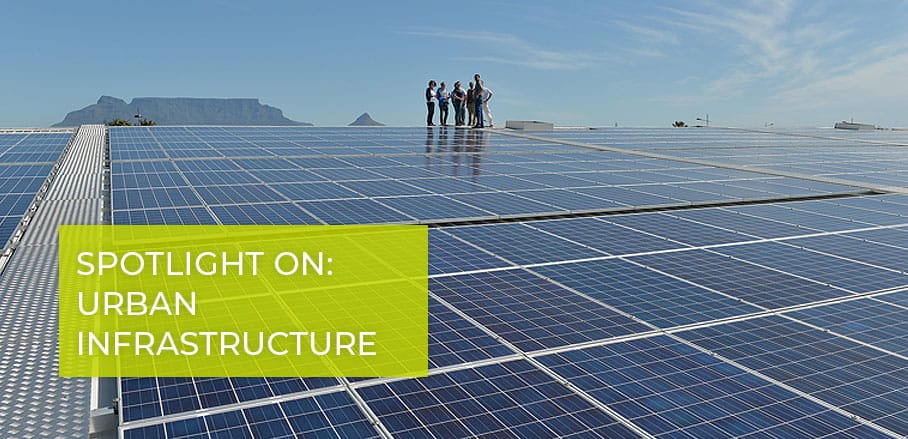Cape Town’s Future is Renewable
Cape Town is committed to providing clean, affordable and accessible energy to all its residents. Increasing the use of renewable energy, implementing innovative financing options, and challenging national energy legislation are some of the ways the city hopes to shift away from a history of inequality, writes Mary Haw.
A History of Energy
South Africa’s vast mineral wealth used to be coupled with enforced social inequality which did not allow the country’s immense resources to be accessed by all its citizens alike. This led to a peculiar energy environment in which the state-owned electricity monopoly installed more generating capacity than the country could use: some power plants were even “moth-balled” in the 1970s. The result was a nation reliant on cheap, coal-based electricity.
With the birth of the “Rainbow Nation” and democracy in 1994, the world watched as South Africa negotiated unprecedented social and economic change. The country joined developed countries in climate change discussions aimed at carbon reduction commitments and became a key player in international negotiations. With government focus shifting to social developments and away from primary electricity supply, we started to see cracks in the state’s energy monopoly as electricity blackouts became more common and the country’s energy future came into question.
Renewable, Affordable, and Non-State
Today, the City of Cape Town finds itself needing to supply electricity to a growing population, 47 per cent of whom are living in poverty – a micro representation of the macro picture in South Africa. Electrification of all households has been a high priority of the national government, and Cape Town is a leader in this regard with approximately 98 per cent of all households provided with high quality electrical connections.
But with a failing national utility, ageing infrastructure, and rising tariffs of over 37 per cent in the last five years alone, many of the vulnerable households cannot afford to buy sufficient electricity to last through the month. The City is now investigating alternative sources of more affordable energy.
Purchasing renewable energy is becoming more affordable due to several factors: globally decreasing costs of renewable energy technologies, South Africa’s own successful Renewable Energy Independent Power Producer Programme (REIPPP), and the nation’s abundant sunshine and wind resources. Those who can are already installing their own energy systems to reduce reliance on the national utility.
Over the past few years, Cape Town has seen a rapid increase in the number of rooftop photovoltaic (PV) installations. In the absence of national legislation regarding Small-Scale Embedded Generation (SSEG), Cape Town developed a set of standards and regulations for the connection of small renewable systems, particularly rooftop solar PV, to the municipal grid.
In 2014, South Africa’s first bi-directional agreement was signed and the first SSEG system with approved feed-in tariff was legally connected to a municipal grid in an office park in Cape Town. Since then, Cape Town’s regulations have been adapted and adopted by many municipalities throughout the country.
A major challenge in this environment is that many customers are illegally connecting to the network without prior approval from the City. Non-compliant systems bring safety risks and legal challenges to network operators, infrastructure, home owners, and the City itself. An active awareness campaign is currently underway to educate customers about the need to register and the implications of unauthorised systems on the network.
Challenging the State
Cape Town is committed to reducing reliance on fossil fuels and to adding renewable energy to the energy mix. One major challenge is the “monopoly buyer” interpretation of current legislation that allows only the national utility to purchase electricity from generators and distribute it to municipalities.
The City is challenging this national legislation in high court to win the right to purchase energy directly from renewable energy independent power producers. The result of this court case could redefine the way South African municipalities purchase energy.
With a more open market, Cape Town hopes to purchase clean power from outside of the municipality. Furthermore, investigations are under way into medium-sized generation plants which can be developed within the City’s municipal boundaries. Ownership models range from fully city-owned, to a partnership model, to independent power producers (IPP) or even to a purely privately owned system.
Innovative Financing
The cost of energy still remains a challenge to many South Africans. The City is investigating ways to mitigate the impact of rapidly escalating electricity tariffs. It does so, not only through bulk purchases from cheaper alternative renewable energy generators, but also through innovative financing mechanisms that allow individual home owners to purchase and install their own rooftop solar PV.
One such mechanism is Property Assessed Clean Energy (PACE) financing, through which property owners, based on the equity of their property and ability to pay, can get up to 100 percent financing for upgrades such as renewable energy installations. The municipality acts as an intermediary between the property owner and the financer by collecting the debt through the municipal rates and taxes. Through this secure financing agreement, customers who may not have been able to access finance for solar PV are now able to take advantage of cleaner, cheaper energy.
There is still much work to do before renewable energy will play the lead role in Cape Town’s energy mix, but as battery storage and other demand management technologies become more viable, renewable energy will play an increasingly important role. The City sees itself as a leader in renewable energy enablement. Hopes are that through our ongoing efforts, we can open the door to cleaner, more affordable energy – not only for our own residents, but ultimately for all South Africans.
- Cape Town’s Future is Renewable - 26. March 2019
